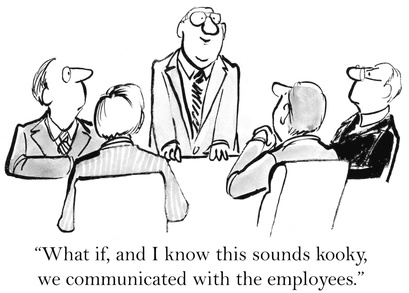Last week, TLNT republished an article from the vault in which John Hollon wrote that when it comes to good bossology, “There is no such thing as over communication.”
How true.
In fact, when ZipRecruiter analyzed 250,000 job ads across a variety of industries, they found that 51 percent mentioned “communication” as a desired skill. No other mention came close. (A college degree, which came in second, was mentioned 21 percent of the time.)
Clearly, communication is king.
Of course, this communication thing isn’t always straightforward. For one, communication is about so much more than the words we say or even how we say them. For another, communication doesn’t merely transmit facts. Instead …
Communication reveals character
Bucky Keady, Vice President of Talent Management at Time Inc., answers work-related questions at Real Simple magazine. Recently she was asked, “Whom can you trust in a corporate environment when you’re starting a new job?”
Keady responded that in the first six months she doesn’t trust anyone because, “You really need to see people operate in stressful situations to learn who they are …” She adds, “Pay attention to how people communicate. That can tell you a lot.”

Well, praise the Lord and pass the biscuits. This advice is so good, I started following Keady on Twitter and am gearing up for a full-blown online stalker campaign.
The five parts of communication
In Why Emotional Intelligence Affects the Bottom Line, author and leadership devel-opment expert Anne Loehr says there are five parts of communication:
- What’s said;
- What’s not said;
- Words;
- Tone of voice;
- Body language.
Again, how true.
So, combining the wisdom of Keady and Loehr, here’s what a person’s communication can teach you about him or her (in five parts or less):
“Watch out! I’m a Taker.”
Yes, people are complex, but ultimately you’re either a giver or a taker. Takers are more often than not angling for how someone or something can benefit them. Givers are more generous and tend to enjoy helping others even if there’s little or no personal gain to be had.
Takers can be known by their words and their non-words alike. Takers:
- Withhold information. This keeps them in control.
- Are gifted at “corporate speak” and the art of saying absolutely nothing in as many words as possible. This keeps their asses covered.
- Aggressively solicit information without reciprocating. This makes me want to scream.
Case in point: I once had a new manager who constantly asked “How are things going?” and “How are you feeling?” ostensibly as a way of showing her concern for my well-being and the development of our working relationship.
Please … she couldn’t have cared less about my well being or our relationship. What she cared about was:
- Her image as a “good manager;” and,
- Getting information to use for God knows what nefarious purpose.
If she HAD cared, rather than try to worm information from me, she’d have offered some useful feedback about my damn performance. But that, ladies and gents, never happened. She was a classic taker.
“I’m a wimp”
Blame shifting is the wimpy manager’s tool of the trade.
I suspect many a wimpy manager justifies his (or her) non-management management with the lie that he (or she) is a progressive sort who “prefers to collaborate” while “giving everyone a fair say.” Uh, no.
The buck’s gotta stop somewhere, manager. Employees (and organizations) aren’t served by a wishy-washy sort who’s indecisive and wants everyone to like everything.
For example, I once interviewed for a job, getting to Round Four before being told by the hiring manager that while SHE had every confidence I could do the job, OTHER (unnamed) people in the company — but not the Executive Director, because I met her during Round Two — weren’t as confident.
Say what?
You, manager, are clearly spineless and probably clueless, too. Thanks for helping me dodge a bullet.
“You can trust me”
Of course, how a person communicates can divulge positive aspects of his or her personality as well.
Two of my favorite clients earned that distinction in the same way — by consistently taking pains to communicate clearly, keeping their word, apologizing for missteps no matter how slight, and showing a genuine concern for their impact on others even when stressed or distracted.
Rather than assume, they asked questions. Rather than state opinion as fact, they took ownership for their perceptions. Rather than ask a potentially embarrassing question in public, they asked it in private (and thereby prevented the possibility of revealing a screw-up to others NOT in the need to know).
At the same time, they held me accountable for results and made it clear they valued good work.
They were gems.
What does your communication say about you?
What does your communication say about you? I guarantee it’s saying something and perhaps something you don’t intend or would be unhappy to learn about yourself. Ask a trusted source, and believe what you hear.
On the flip side, what have you learned about others through their communications? Spill it in the comments below.
